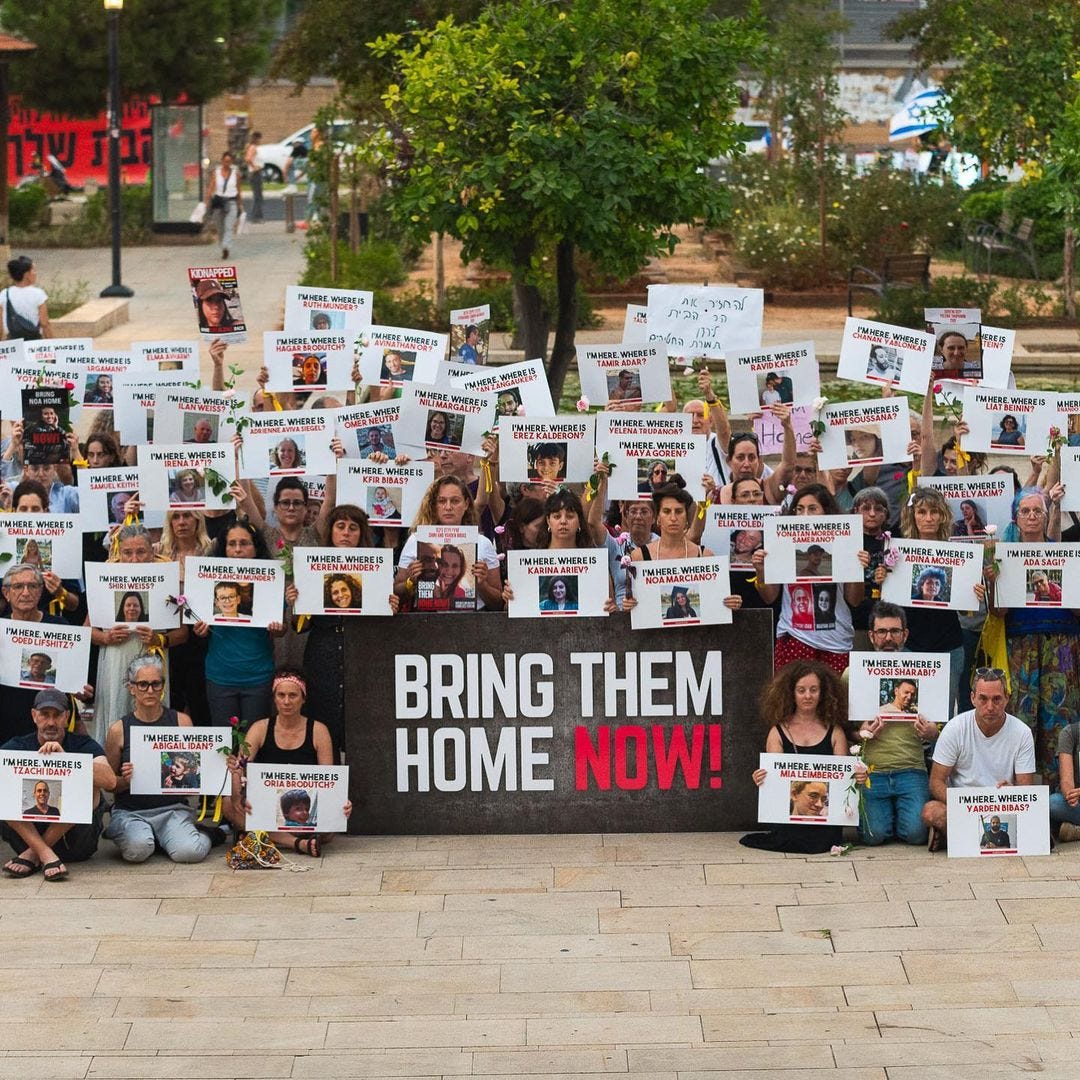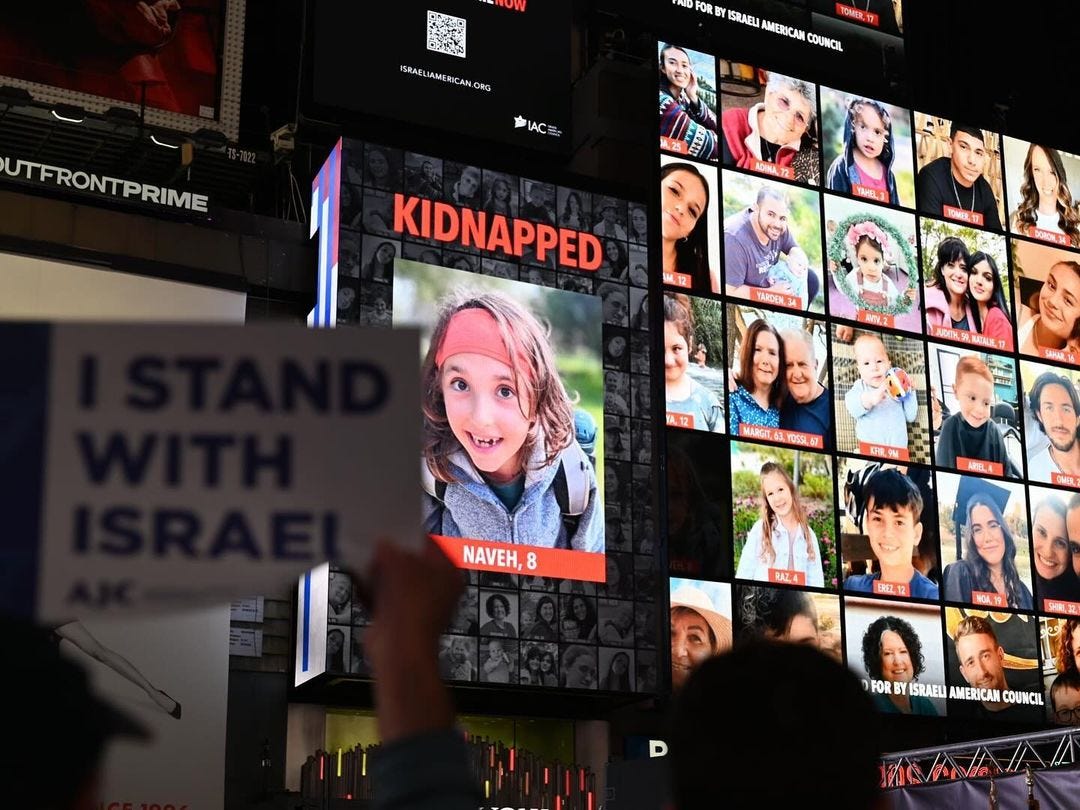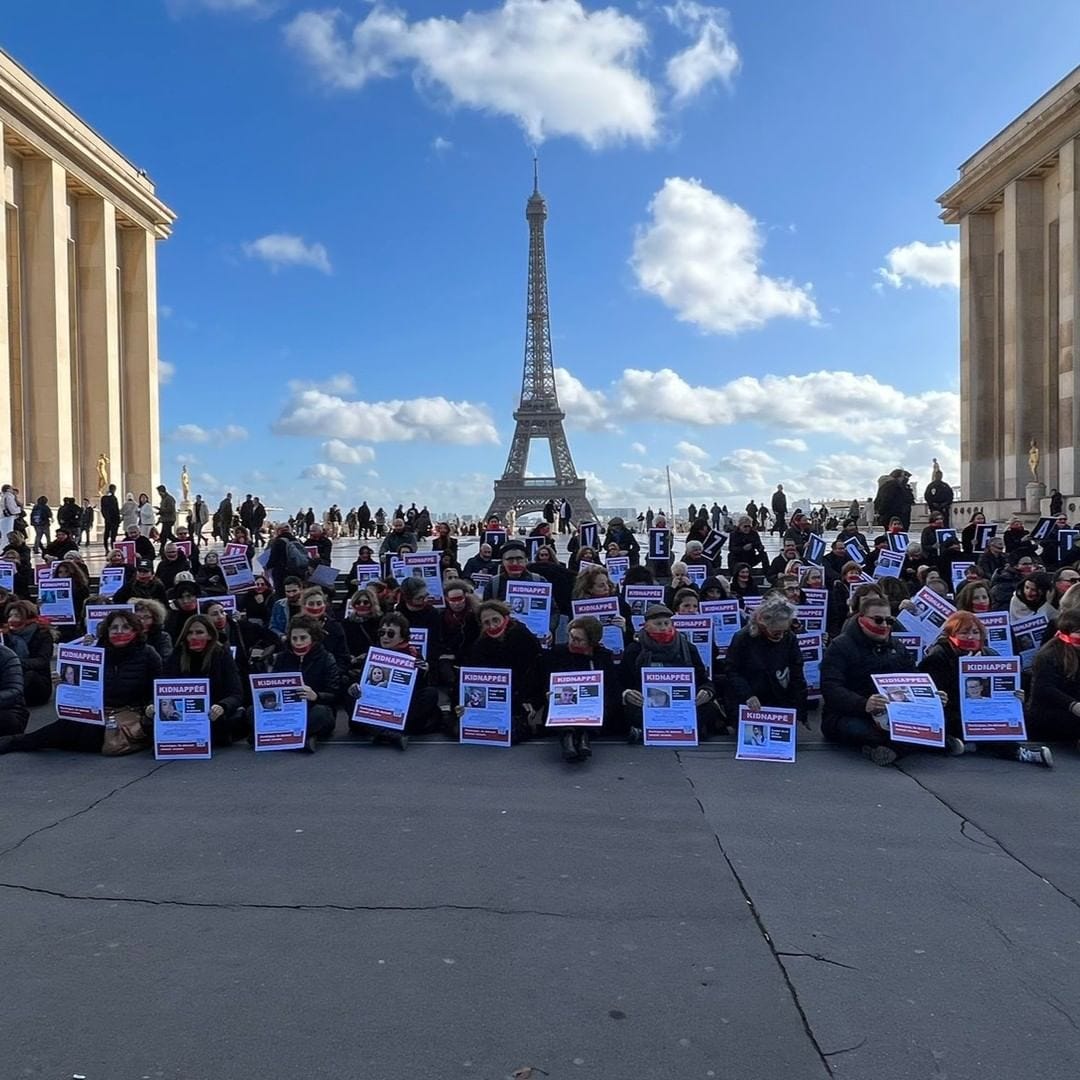Why the Kidnapped Still Haven’t Been Freed
The situation is unprecedented “not just for Israel, but for the world,” according to a counterterrorism expert.
Editor’s Note: In light of the situation in Israel — where we are based — we are making Future of Jewish FREE for the coming days. If you wish to support our critical mission to responsibly defend the Jewish People and Israel during this unprecedented time in our history, you can do so via the following options:
You can also listen to this essay if you prefer:
As of writing this essay, some 240 people — including 30 children, 30!! — are still sitting in Palestinian captivity since October 7th, likely somewhere within Gaza’s intricate web of underground tunnels.
Aside from the pure insanity that there are Israelis kidnapped, Americans kidnapped, British kidnapped, French kidnapped, Thais kidnapped, Russians kidnapped — and people are marching, not in support of the kidnapped, but in support of the kidnappers — the situation itself is unprecedented “not just for Israel, but for the world,” according to counterterrorism expert Boaz Ganor.1
“Although similar operations have been conducted by ISIS in Syria and Iraq, this is something that hasn’t been seen in other places around the world by other terrorist organizations,” he added. “It reflects a certain level of inhumanity and cruelty that even for me, a counterterrorism expert in the business for approximately 40 years, is astonishing.”
Ganor also warned: “Unfortunately, when it comes to terrorism, anytime Israel faces a new type of terrorism, the rest of the world is later challenged by the same practices. We have seen it with hijackings, kidnappings, with suicide attacks, and now I can almost guarantee that, unfortunately, we will see this atrocity copied by other terrorists in other places in the world in the future.”
Generally, Israel’s official policy in hostage situations — not to be confused with the current kidnapping situation — is always the preference of a rescue operation if the option exists, regardless of risks to the lives of hostages and to Israeli soldiers tasked with saving them.
When the plausibility of a rescue operation doesn’t exist, Israel resorts to negotiations — usually the exchange of prisoners, convicted prisoners, to return the hostages and save their lives. But since Israel has never experienced the kind of atrocity it did on October 7th, Ganor said “there is no policy to refer to.”
Public pressure also has a “huge influence on the government’s decision,” according to Ganor, especially in a tiny country where almost everyone knows someone affected by the October 7th attacks and those who were subsequently kidnapped.
The best example of Israeli society pressuring its government in such affairs is when Gilad Shalit, an Israeli soldier, was kidnapped into Gaza by Hamas in 2006. While Benjamin Netanyahu, who became Israel’s prime minister shortly thereafter, publicly declared in every interview that he would never surrender to Palestinian terrorists’ extortionist demands, public pressure pushed him to hand over more than 1,000 such terrorists for Shalit’s release in 2011.
During the last few weeks, Israeli leaders have publicly stated that they would trade all the thousands of convicted Palestinian terrorists sitting in Israeli jails for the 240 kidnapped people. Not only do I as an Israeli citizen and resident support such a deal, but I believe them when they say it.
I also believe that Hamas hasn’t genuinely been interested in such a framework because, who’s to say that after it happens, Israel won’t covertly pursue the assassinations of Hamas leadership, even if Israel agrees to a ceasefire amid the prisoner-for-kidnapped swap? For all the popping off about “martyrdom” that Hamas leadership does, they seem to be among the few Palestinians who don’t want to be die in the name of Islam.
What’s more, Ganor contends that a prisoner-for-kidnapped swap is unlikely for the time being “because we are in a war situation that has an existential impact on Israel. If Israel is unable to make clear to Hamas, Hezbollah, and Iran that this was foolish and counterproductive, we would see them attacking Israel again in a short period of time. Those considerations are top of mind for Israeli decision-makers, much more than any public pressure right now.”
To truly understand Ganor’s analysis, we have to understand the two main types of extortion that terrorists employ when they take people captive. The first type is barricading: using a building or motor vehicle to hold hostages within a known facility.
“While it’s very complicated to conduct a rescue operation,” Ganor said, “you still have the intelligence needed to know where they are in order to start planning a rescue operation.”
Hence why Israel has successfully completed some of the world’s most challenging rescue operations, such as Operation Thunderbolt, a 1976 mission in Uganda launched after the Palestinian-led hijacking of an international civilian flight between Tel Aviv and Paris. In total, some 250 hostages were saved, and the Israeli commandos only suffered one loss: Yonatan Netanyahu, the brother of Israeli Prime Minister Benjamin Netanyahu.
In 1980, Palestinian militants captured a group of toddlers and babies in the children’s sleeping quarters of a kibbutz in northern Israeli, taking them hostage. The event ended the next day with a takeover of the terrorist stronghold by Israeli special forces, even though three Israelis were killed (including a two-year-old).
In 1984, Palestinians hijacked an intercity bus en route from Tel Aviv to Ashkelon, with 41 passengers. Israeli commandos again led the rescue operation, freeing everyone except for a 19-year-old soldier who was killed by Israeli fire during the takeover operation.
But today’s situation in Gaza is not one of barricading. It’s the second type of extortion: kidnapping. The difference between being taken hostage and being kidnapped is that, with kidnapping, the captives’ location is unknown.
“They are not being held in one place,” Ganor added. “They have been spread out in different places. Islamic Jihad is claiming to hold 30 of them, and Hamas is holding others, and you have other small jihadi organizations that might have their own Israeli hostages.”
“The uncertainty, the density, and the underground city built in Gaza, and the amount of hostages spread in different parts of Gaza, take a rescue operation out of the equation,” he said, reiterating that a rescue operation would be “close to zero-percent success.”
In a “typical” hostage crisis, according to Ganor, decision-makers calculate the risk that terrorists will harm the hostages, or that the rescue team will be hurt during the operation — as long as accurate intelligence, manpower, and an experienced rescue team exist.
But, as Ganor accurately pointed out, this is not just a military operation. This is war — “the worst war that Israel has ever faced,” he said, alluding to the Palestinian massacre in Israel on October 7th. As such, Israel is engaging in some of the harshest attacks on Gazan soil, which includes a synchronous onslaught of aerial, sea, intelligence, cyber, and ground forces.
“Those types of activities would not support a fast secure deal of exchanging our hostages for the convicted terrorists that they want to free from Israeli jails,” Ganor said. “It’s still possible to conduct a full-scale military operation and use intelligence aiming to free hostages there, but the possibility of doing that simultaneously and freeing the hostages unharmed is close to zero.”
You might recall that Israel waited to on its ground invasion of Gaza for a few weeks. The United States reportedly pressed Israel to delay, citing the need to allocate more military defensive postures across the Middle East, but my inclination was that the United States wanted Israel to hold off in the event that ongoing negotiations would yield the release of more of the kidnapped, of which there are some 20 U.S. citizens.
However, as the negotiations dragged on and as Israeli forces remained on increasingly impatient standby along the Gaza-Israel border, negotiations seemed to be running in circles. Ganor thinks this is because Qatar and Turkey, who are reportedly representing Hamas in the negotiations, “are not the solution.”
“Qatar and Turkey are big supporters of Hamas, and I haven’t heard them standing against this savage attack,” he said. “They are incapable of mediating between Israel and Hamas because they took a wrong normative stance. What happened in Israel is a crime against humanity, and any state that supports these terrorists should be sanctioned and condemned.”
Ganor believes Egypt would be a better mediator between Israel and Hamas, but Egypt and Hamas aren’t exactly on the best of terms. After all, Egypt has closed off its border with southern Gaza, on the grounds that Hamas is unable or unwilling to provide proper security on the Palestinian side.
The United Nations and the Red Cross could also play a mediation role, according to Ganor, but then Hamas would be effectively forced to deal with the United States, since it has significant influence within both of these organizations. And we know loud and clear that the United States does not stand with Hamas.
For now, Hamas only has one card left in its feeble hands, especially now that Israel just announced it has encircled all of Gaza City, home to the majority of Hamas’ infrastructure. Israel has been clear that they will not agree to any ceasefire until all kidnapped people are released, and the international political community has largely backed this Israeli posture.
In recent days, there has been talk in Israel of “the 1982 scenario” — a reference to a deal the Israelis made with Palestinian terrorists in the summer of 1982, against the backdrop of the First Lebanon War, in which said terrorists agreed to be deported from Lebanon to Tunisia and other countries that would accept them.
The problem with this comparison is that there are many differences between those Palestinian terrorists and the ones Israel is dealing with in Gaza. First, many of the top heads of Hamas don’t even live in Gaza, so deportation is irrelevant. They’ve already “deported” themselves to places like Qatar, Turkey, and Lebanon.
Another difference between then and now is that, in 1982, the Palestinian terrorists were “basically guests in Lebanon,” whereas today’s Palestinian terrorists are from Gaza, “at least those who are in the Gaza Strip,” according to Avi Melamed, a former Israeli intelligence official and Senior Official on Arab Affairs.2
Melamed also believes that Hamas is guided by a different mindset than those Palestinian terrorists in 1982 — a mindset that is ironically similar to “the Samson Option,” named after the biblical Israelite judge Samson who killed himself and thousands of Philistines who captured him, crying out “Let me die with the Philistines!”
In other words, “If I’m going down, everyone is going down with me.”
We also have to remember that it’s been Israel’s stated goal — and also that of the United States — to topple Hamas’ political and military rule in Gaza, a goal that has no comparative substance with the First Lebanon War in 1982.
Assuming the Palestinian terrorists in Gaza and elsewhere don’t want to be toppled, the kidnapped now serve as one of their dwindling deterrences to this stated goal, which is what makes Palestinian terrorists so sick and, as others have called them, subhuman.
It’s also what makes this kidnapped situation so unbelievable, and what makes ending this essay so difficult. As much as we want to culminate it with some slight form of optimism, it feels contradictory to be both intellectually honest and even a little bit optimistic about the state of the kidnapped (for the time being, at least).
So, as the 240 children, women, elderly, and others await their fate, all we can do is wait with them in our hearts and minds, incessantly advocating for their release until it hopefully happens, and remembering that, while this predicament is truly unprecedented, maybe — just maybe — Israel will find a way to pull off yet another remarkable mission.
In light of the situation in Israel — where we are based — we are making Future of Jewish FREE for the coming days. If you wish to support our critical mission to responsibly defend the Jewish People and Israel during this unprecedented time in our history, you can do so via the following options:

“Why the Israeli Hostages Face Grim Prospects.” Foreign Policy. October 12, 2023, https://foreignpolicy.com/2023/10/12/israel-hamas-attack-gaza-hostages.
“30 Days into the Israel Hamas War | Analysis by Former Intelligence Official Avi Melamed.” INSIDE THE MIDDLE EAST by Avi Melamed. November 7, 2023. YouTube.






